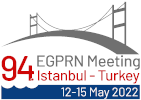- International Keynote: Zalika Klemenc Ketiš
- National Keynote: Prof. Dr. Mehmet Akman
- Practice Visits
-
Pre-conference Workshop
- Workshop 1: Operational research in primary care: Opportunities for collaboration
- Workshop 2: How to read a paper: critical appraisal skills for randomised controlled papers
- Workshop 3: Project Planning & Proposal Writing Workshop
- Workshop 4: Research in a Primary Care in the Routine Primary Care Clinical Setting: A closer look to research methodology.
National Keynote
Prof. Dr. Mehmet Akman
Professor of Family Medicine
Marmara University Medical Faculty, Istanbul
Consultant, WHO Azerbaijan
Mehmet Akman is general practitioner and professor working in the field of primary care. He has a family medicine background, received a master degree in public health and has an extensive experience as a tutor in under and post graduate medical education, primary care and educational research. He is the Chair of the WONCA Working Party on Research and member of the board of Trustees of TAHEV (Turkish Foundation of Family Medicine). He was advisory board member of EFPC (European Forum for Primary Care) between 20013-2019 and is associate editor of Primary Health Care Research and Development journal. His recent works are mainly about organization of primary care, multi-professional primary care research, chronic disease management at primary care level and post graduate training of family doctors. He is involved in international research and projects as national coordinator, advisor, or research coordinator. He served as consultant for WHO (world health organization) Azerbaijan for assessment of primary care services and capacity building of healthcare professionals. He is the leading or co-author of more than 60 national and international articles published in peer reviewed scientific journals including primary care educational research and over 10 chapters in medical books. He is the editor of WONCA endorsed book How to Do Primary Care Educational Research. His present position is professor of Family Medicine at Marmara University School of medicine Family Medicine Department, İstanbul, Turkey.
Establishing Primary Care; Turkey and Azerbaijan Primary Care Organization
Strong primary care (PC) does not develop spontaneously but requires a well-developed organizational planning between levels of care. Primary care-oriented health systems are required to effectively tackle unmet health needs of the population and efficient primary care organization (PCO) is crucial for this aim. Via strong primary care, health delivery, health outcomes, equity, health security could be improved. Despite remarkable improvements in the health outcomes of the global population during the era of the Millennium Development Goals, important gaps persist in people’s ability to attain the highest possible level of health. About half of the world’s population lack access to the services they need, and poor health disproportionally affects those faced with adverse social and other determinants of health, driving health inequity both within and between countries.
Outbreaks of global pandemics or emergencies like COVID-19 are the biggest challenges for the “resilience” of primary care systems. Therefore, countries need to establish a regular system of facility assessments to provide objective measures for evaluating the availability, readiness, quality and safety of health services, including measures to evaluate preparedness and response capacities.
In this presentation, the key aspects and benchmarks of PCO will be explored based on previously mentioned frameworks and domains. Five major aspects of PCO (governance, finance, workforce and facility management, organization of service provision and relational organization) will be explored. As an examples of health systems in transition, Turkey and Azerbaijan’s primary care organization will be evaluated in terms of achievements and areas having room for further development. WHO (World Health Organization) perspective mentioned in the document “Operational framework for primary health care: transforming vision into action (2020)” will be used as basis of this evaluation.
As a conclusive statement; it is crucial to ensure accessible, continuous, person-centered, community oriented, coordinated and integrated primary care services provided by competent and socially accountable multi professional teams working in a setting where clear policy documents exist, adequate funding is available, and primary care is managed by dedicated units for establishing a strong PCO.


